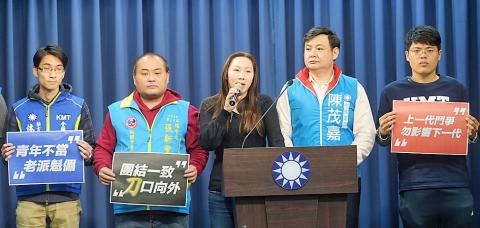Lin Hsing-er (林杏兒), head of the Chinese Nationalist Party’s (KMT) Department of Youth Affairs, yesterday called for an end to infighting after former KMT secretary-general King Pu-tsung (金溥聰) joined party members opposed to the reinstatement of Independent Legislator Fu Kun-chi’s (傅崐萁) membership.
King in a Pop Radio interview said that Fu was “like a time bomb,” adding that the decision regarding his reinstatement should not be made until the party elects a new chairperson and Central Standing Committee members on March 7.
Reinstating Fu, who was expelled from the party in 2009, would be a “hasty and wrong decision,” King on Monday told a news conference held by a group of younger KMT members, including Taipei City Councilor Hsu Chiao-hsin (徐巧芯).

Photo: Chang Chia-ming, Taipei Times
Lin, who is also on the KMT’s Central Standing Committee, urged younger party members not to become “puppets” in what she described as a continuation of the infighting that had damaged the party in the past.
Infighting has re-emerged just as the KMT is about to reform, Lin said.
“Do not leave the previous generation’s fighting to our generation,” she said. “Our generation hopes for and needs change.”
“The DPP [Democratic Progressive Party] should be the first to oppose Fu Kun-chi’s return to the KMT,” Lin said. “But oddly, it was KMT people who came out to stop it.”
“Right now, the KMT’s primary battleground is in the Legislative Yuan,” she said. “We need to unite more forces.”
Lin asked why the party would close its doors to Fu “when the KMT is most in need.”
“Would it be bad for the KMT to have one more [legislative] seat?” she asked.
“The edges of [the KMT’s] knives should be pointed outward,” she said, calling for party unity amid plans for reform.
KMT Central Committee member Chen Mao-chia (陳茂嘉) echoed Lin’s call, saying: “It is the KMT that needs Fu Kun-chi and not Fu Kun-chi who needs the KMT.”
The KMT’s Party Disciplinary Committee was scheduled to review Fu’s case yesterday, but the KMT in a statement on Monday said that the meeting would be canceled because a quorum would not be reached.
Additional reporting by CNA

Taiwan is to commence mass production of the Tien Kung (天弓, “Sky Bow”) III, IV and V missiles by the second quarter of this year if the legislature approves the government’s NT$1.25 trillion (US$39.78 billion) special defense budget, an official said yesterday. Commenting on condition of anonymity, a defense official with knowledge of the matter said that the advanced systems are expected to provide crucial capabilities against ballistic and cruise missiles for the proposed “T-Dome,” an advanced, multi-layered air defense network. The Tien Kung III is an air defense missile with a maximum interception altitude of 35km. The Tien Kung IV and V

The disruption of 941 flights in and out of Taiwan due to China’s large-scale military exercises was no accident, but rather the result of a “quasi-blockade” used to simulate creating the air and sea routes needed for an amphibious landing, a military expert said. The disruptions occurred on Tuesday and lasted about 10 hours as China conducted live-fire drills in the Taiwan Strait. The Civil Aviation Administration (CAA) said the exercises affected 857 international flights and 84 domestic flights, affecting more than 100,000 travelers. Su Tzu-yun (蘇紫雲), a research fellow at the government-sponsored Institute for National Defense and Security Research, said the air

A strong continental cold air mass is to bring pollutants to Taiwan from tomorrow, the Ministry of Environment said today, as it issued an “orange” air quality alert for most of the country. All of Taiwan except for Hualien and Taitung counties is to be under an “orange” air quality alert tomorrow, indicating air quality that is unhealthy for sensitive groups. In China, areas from Shandong to Shanghai have been enveloped in haze since Saturday, the ministry said in a news release. Yesterday, hourly concentrations of PM2.5 in these areas ranged from 65 to 160 micrograms per cubic meter (mg/m³), and pollutants were

Taiwan’s armed forces have established response protocols for a wide range of sudden contingencies, including the “Wan Chun Plan” to protect the head of state, the Ministry of Defense (MND) said today. After US President Donald Trump on Saturday launched a series of airstrikes in Venezuela and kidnapped Venezuelan President Nicolas Maduro, concerns have been raised as to whether China would launch a similar “decapitation strike” on Taiwan. The armed forces regularly coordinate with relevant agencies and practice drills to ensure preparedness for a wide range of scenarios, Vice Minister of National Defense Hsu Szu-chien (徐斯儉) told reporters before a